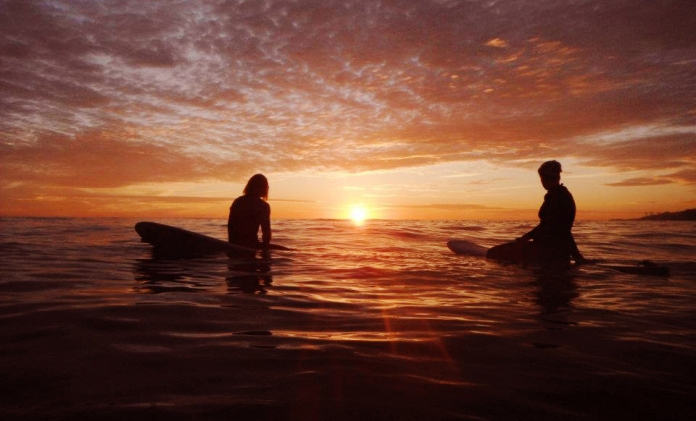My work in the words of others in print and around the web.
Sampling of recent press collected from ISSUU, newspapers, Google News & more.
The Paradise Press
Blue Mind Theory Shows the Many Health Benefits of the Ocean
Posted on Mar 7th, 2019Author and marine biologist Dr. Wallace J Nichols has conducted years of research to show how being in, on, under, or near the ocean is beneficial to our health.
In his book, “Blue Mind” he describes why we as humans are drawn to the ocean, how our brains are affected, and how it affects our general well-being.
Many studies in the past focused on how our brain is affected by different mediums. From music to television to even specific commercials, these are all things that have been researched. However, a study on the effect of the rhythms of the ocean on the brain had yet to be conducted.
In 2011, Nichols decided to change that by bringing together a group of widely different people including neuroscientists, artists, urban planners, and even real estate agents. They researched the ways in which our minds, bodies, and souls are affected by water. This “Blue Mind Gathering” went on to conduct many experiments and tests to find the answers.
The Ocean Relaxes Us
Through many different studies, it has been found that the ocean indeed does benefit our health. It induces a state of relaxation and a meditative like state.
The Sands Research Group studied a group of 45 women who were asked to watch a combination of commercials, comedy skits and ocean environments. The EEG readings indicated that the water images evoked both positive emotions and a longer attention span.
Adena Leibman, Ocean & Coastal Policy Advisor for U.S. Senator Sheldon Whitehouse, has spent much of her life in relationship with the ocean. She agrees that the ocean indeed has a tranquil effect.
“Its scale is almost unfathomable, and there’s something simultaneously awe-inspiring and soothing about that. It’s hard to get worked up about the little things when you realize you’re kind of a little thing yourself. But for me, since I’ve kind of dedicated my career/life to the oceans, it’s also inspiring from the sense that time near and in the ocean reinvigorates my passion to protect it.”
Ocean Related Activity Increases Health
Another relevant study concluded that Australians in New South Wales who lived closer to the ocean were 27 percent more likely to have higher activity levels and 38 percent more likely to partake in regular vigorous activity.
Water related activity was also found to reduce the symptoms of PTSD. A study conducted by researchers at the University of South Maine, the University of Utah, and the Salt Lake City Veterans administration found improvements in all the areas monitored after veterans were taken on a four day trip exploring rivers in wilderness locations. PTSD symptoms and perceptual stress decreased overall by 19 percent and physical stress symptoms went down by 28 percent. Sleep quality also improved and depression and anxiety lessened significantly.

Photo Courtesy of isoladibiza.com
Surfing is great example of how water positively affects us and is ever present in Nichols’ studies. He says, “…surfers probably exhibit more Blue Mind than anyone. They are attuned to the water, used to watching it carefully for hours on end, reading its changes, looking for the smallest indication that the next wave will be, if not the perfect wave, at least rideable.” Anna Troy, a local surfer, fits this description in spades. Since getting her first surfboard at the age of 9, she has been addicted. Troy says, “sitting on a surfboard with your thoughts is one of the best meditations I think there is. When I am paddling on my surfboard during heavy surf it can be one of the most mentally challenging things that I do…My mind is the only thing I can hear cheering me on…and once you are there it is one of the best feelings of relief!”
Nichols’ extensive research, discussed in detail in his book, shows the true healing power of water including additional studies of its effect on specific things like addiction and Autism.
Nichols also says that our connection to the water can improve our creativity. In discussing many artists’ inspiration drawn from the ocean he says, “…Water’s infinite variety and (sometimes terrifying) depth has an unrivaled inspirational force when it comes to the physical world.”
For more in depth information on Nichols’ studies, read his book “Blue Mind: The Surprising Science That Shows How Being Near, In, On, or Under Water Can Make You Happier, Healthier, More Connected, and Better at What You Do.”
Relevant Links:
http://www.huffingtonpost.com/2016/02/25/mental-benefits-water_n_5791024.html
http://biophiliccities.org/blue-mind-an-interview-with-wallace-j-nichols/
To post a comment, please login.
View this profile on InstagramDr. Wallace J. Nichols (@wallacejnichols) • Instagram photos and videos
What's New
Rochester Women's Magazine
If You Want To Heal, Find Water
Where did our water come from? One theory is from comets and asteroids nearly 4 billion years... continue
New Trader U
The Science Behind The Ocean's Effect On Our Brain
The ocean has long been a source of fascination and wonder for humans. Its vast expanse, rhythmic waves... continue
Red Bull: Understanding the Blue Mind Theory: How water influences our well-being
Read ahead to learn all about this potential mind-body-water connection.
Red Bull surfer Kai Lenny will take any chance he can get to spend time in the sea. &ldquo... continue
